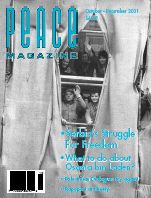
Peace Magazine Oct-Dec 2001, page 21. Some rights reserved.
Search for other articles by Lucky Lanre-Ojo here
The Federal Republic of Nigeria is a West African coastal state on the shores of the Gulf of Guinea, with Benin Republic to the west, Niger to the north, Chad to the northeast, and Cameroon to the east and southeast. The climate is tropical, with an average annual temperature of 32 degrees C and high humidity. Average annual rainfall is more than 2,500 mm in the south, but in the north it is as low as 600 mm. Although the country is made up of over 250 ethnic groups, the most widely spoken languages are Hausa, Yoruba and Ibo, while English is the country's official language. The capital was transferred in 1991 to Abuja, but Lagos still remains the commercial city, as many non-government institutions remain in the former capital.
Nigeria is one of the best-endowed countries of the world, in terms of natural and human resources. With a population of about 150 million, it is the largest black African country. The country is rich in petroleum and liquefied natural gas in the south, peanuts and cotton in the north. However, the major source of export income is petroleum. Over 250 million barrels of crude oil is daily produced, thereby placing Nigeria as one of the six largest oil producers in the world. The irony, however, is that, in spite of the stupendous wealth, Nigerians are ubiquitous across the global landscape in search of a greener pasture, owing to the strangulating poverty back home. A first time visitor to Nigeria is confronted by this paradox, as it is difficult to reconcile the architectural edifices that line the streets with the poverty on the faces of hopeless citizens.
So bad is the poverty that as far back as 1985, destitute Nigerians had begun scavenging for food. The situation is worse today. Although the economic situation in Nigeria can be attributed to multifarious factors, which include large-scale corruption, the major cause is mismanagement of resources by successive leaders.
Prodigal leadersSince 1960, when she won political independence from Britain, Nigeria has had to cope with eleven prodigal leaders, each of whose score sheet read below average. Eight of the leaders were unelected military officers who ruled for a total of 25 years. Eight of the 11 leaders are from the northern part and have ruled for over 35 years of the country's 41 years of independence. This forms the crux of the political instability that has engulfed the country in recent times. After three decades of visionless rulership and plundering of the economy, the south, which produces the crude oil on which the economy thrives, seems to have had enough of the northern olgarchy's oppressive and exploitative reign. That is why the entire country is now enveloped with a vociferous agitation for a National Conference, where the future of the country can be determined. Predictably, the north does not favor this agitation, for it is obviously comfortable with the status quo.
Tribal militantsA political analyst once said, "if a peaceful change is made impossible, forceful change becomes inevitable," and this explains the retinue of tribal militant groups across the country. In the southwest, the Oodua Peoples' Congress (OPC) was formed in 1994, after the annulment of the country's freest and fairest presidential election, won by the late M.K.O. Abiola, a Yoruba man from the southwest. In seven years of its existence, OPC has engaged the Nigeria Police Force in a formidable bloody clash, in an attempt to win political independence for the Yorubas. Other militant groups in the southeast are the Egbesu Boys, Ijaw Youth Council, and Movement For the Survival of the Ogoni People (MOSOP). Incidentally, there are more oil wells in this part of the country than in other parts of the south, but the poverty and under-development there is incredible. Ironically, this is the base of multinational corporations like Shell, Texaco, Chevron, and other oil exploring companies. Apart from being tied in a bloody imbroglio with security forces, these militant groups also employ other strategies including kidnapping, hijacking of aircrafts and setting oil rigs ablaze in order to attract government attention to their poverty in the midst of plenty. The Arewa People's Congress (APC) in the north are, for their part, not as restive as their counterparts across the nation. Apparently, there is little or nothing to fight for. Unlike in the south, the road network in the north is in top condition. Electricity is less epileptic, and the taps run. Nevertheless, the pangs of poverty in the north appear even more excruciating than in the south, but there is more docility in the north, compared to the south. Due to this tribal disaffection, the government of President Olusegun Obasanjo is now faced with a dilemma that could split the country.
The OptionsIf a National Conference is convened, chances are high that other parts of the country would make demands that the North would find disagreeable, which could result in disintegration. Should the government however shut its ears to the agitations for the Conference, then it must be prepared to live with the bloody activities of the growing army of militant groups. Neither of these options is likely to appeal to the government, yet it is not likely that the restive sections of the country can be placated outside the platform of a Sovereign National Conference. Like the hand of a pendulum, time will tell which direction Nigeria will swing.
Lucky Lanre-Ojo is a Nigerian-born journalist working in Toronto.

Peace Magazine Oct-Dec 2001, page 21. Some rights reserved.
Search for other articles by Lucky Lanre-Ojo here